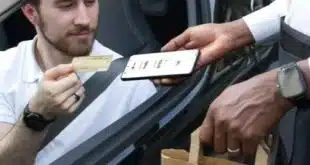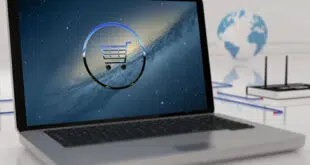Startup Revel Systems Inc. this week unveiled a device it is touting as a way for retailers using an Apple iPad for point-of-sale functions to run peripheral devices without an Ethernet router. The device, called the Revel Router, accesses the Internet via the iPad’s cellular connection.
San Francisco-based Revel, which recently updated iPad POS software that it introduced eight months ago, says the new router will let merchants continue to run transactions when their Internet connections fail. The Revel software allows users to run peripherals like receipt printers, card swipers, cash drawers, and coin dispensers from their iPads. The router also lets merchants bypass the cost and hassle of setting up, wiring, and maintaining conventional Internet connections with an Ethernet router, the company says.
Revel, whose clients are chiefly restaurants, says merchants are looking for a solution that keeps operations running and also avoids the hassles of cabling. “The biggest problem for all these restaurants is the Internet connection,” Lisa Falzone, chief executive and co-founder of Revel, tells Digital Transactions News.
The new router, which is approximately the size of an iPhone but an inch thicker, is sold as part of a package that includes an iPad, receipt printer, card swiper, and other hardware as well as a software license. The total package is priced at $3,200, with an additional fee of $100 per month per location. Revel says it developed the router itself, working with a hardware program offered by Apple Inc., after it couldn’t find what it wanted on the market.
But some observers say the price may be a barrier for Revel. “$3,200 strikes me as getting pretty spendy pretty quick,” says George Peabody, who follows mobile POS as director of the emerging technologies advisory service at Boston-based Mercator Advisory Group. “They better be adding a whole lot of good merchant-facing software to make that a go.” He also questions whether increased reliance on the iPad’s 3G connection will drive up retailers’ data-plan pricing.
Falzone says the package price is anywhere from half to one-third of the cost of a conventional POS system, while the cellular link consumes only about 200 megabytes of data for 2,000 monthly transactions. “For the demographic we’re targeting, it’s a good deal,” she says. Revel’s merchants process about $300,000 per year on average in card transactions, she estimates.
While competitors like Square Inc. offer to small and micro-merchants iPad-based replacements for cash registers and POS terminals, Revel primarily caters to merchants with established stores, in some cases chains of stores. Popeye’s, Twistee Treat, Illy Coffee, and Camille’s Sidewalk Café are among merchants rolling out the company’s iPad software, according to Falzone. Altogether, Falzone says more than 300 merchant locations are using the software. The new version of the product, released earlier this month and called Atlas, introduced support for multiple locations, among other improvements.
Also this week, MasterCard Inc. announced it is working with mobile-offers startup Shopkick Inc. to let cardholders earn rewards on so-called qualifying purchases. Cardholders must link their cards to Palo Alto, Calif.-based Shopkick’s service, which works through the user’s mobile device to detect when the user is in a participating store. The Shopkick app then delivers rewards points, or “kicks,” to the user on merchandise from partner brands carried by that store.
As part of the deal with MasterCard, which went live Wednesday, cardholders who link their cards to Shopkick’s Buy & Collect program can earn kicks when they use the cards to buy certain merchandise. This follows a similar deal Shopkick made with Visa Inc. in November. MasterCard says cardholders can also get 250 extra kicks for linking one or more cards during what MasterCard calls a “limited time.”
Both companies say the collaboration should help brick-and-mortar merchants fight the growing problem of so-called showrooming, where consumers check out products in physical stores before buying them at a lower price from online merchants.
Merchants that work with Shopkick include American Eagle Outfitters, Arden B., Best Buy, Crate and Barrel, Old Navy, Toys ‘R’ Us, and Wet Seal. Users can get offers from Shopkick merchants or redeem kicks for items ranging from restaurant vouchers to gift cards and movie tickets. Launched in August 2010, the free Shopkick app, which works on both the iPhone and Android platforms, attracted 3 million users in its first 18 months, the company says.





